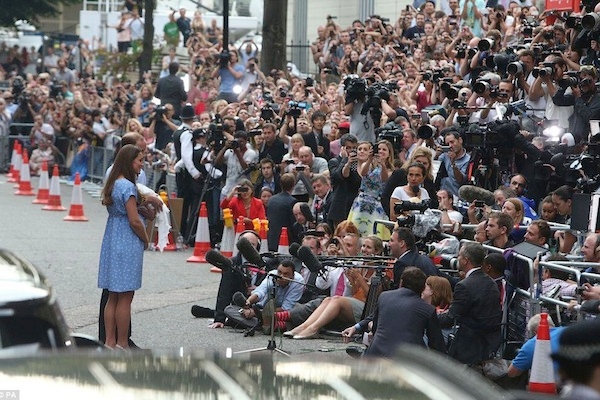Congratulations to Kate and William, and Baby Cambridge, who has an extensive Wikipedia entry already but no name. The poor couple faced the cameras yesterday with good grace, which is the last thing you’d want in their situation; after my wife’s last labour was over I looked like one of the crew from Das Boot and I’d barely done anything.
Not everyone is so keen to join in, which is why The Guardian has been offering readers the chance to switch off all coverage of royalty with a ‘republican’ button. It’s an interesting foretaste of newspapers tailoring news and comment towards an individual’s own interests. Facebook and Google already use filter bubbles, so that news feeds ‘edit out’ the updates of people whose links you’re less likely to click on, in my case those Leftie friends’ posts about 38 degrees. They become like just a vague whisper of Thought for the Day on a radio turned down: you can sort of tell by the sanctimonious tone that your mate is having a go at the Tories about something, but only vaguely.
Newspapers have always focused on news and comment that appeals to the readers’ prejudices, but online news services can target their customers a lot more accurately. Reading that our prejudices are correct gives us a little dopamine hit, so a site that delivers that service has an advantage. The internet offers news designed towards self-actualisation, just like any other form of consumerism, and this explains why people get increasingly angry at the BBC, which can’t do all those things; Republicans are furious at the Beeb’s tone only because they’re so used to hearing news that confirms their views rather than being exposed to others.
Perhaps in future BBC current affairs programmes will have little interactive red buttons that tell the news differently depending on prejudice. Having perverse tastes, I’d like a setting where the news was told in deadpan PC cant; the more reality ridiculously contradicted the theory, the more over the top it would become.
But I can’t help but think this isn’t going to make our world a better place. Political polarisation is not a good thing, either for the individual or society, and the unfailing rule of politics is that the more one knows about a subject, the more one doubts things. Maybe the internet won’t actually bring us together, as part of Peter Singer’s expanding circle. Printing triggered a century of religious hatred and violence as people on both sides whipped themselves into a frenzy in print, and it could happen again. Maybe we’re all just better off looking at porn instead.







Comments